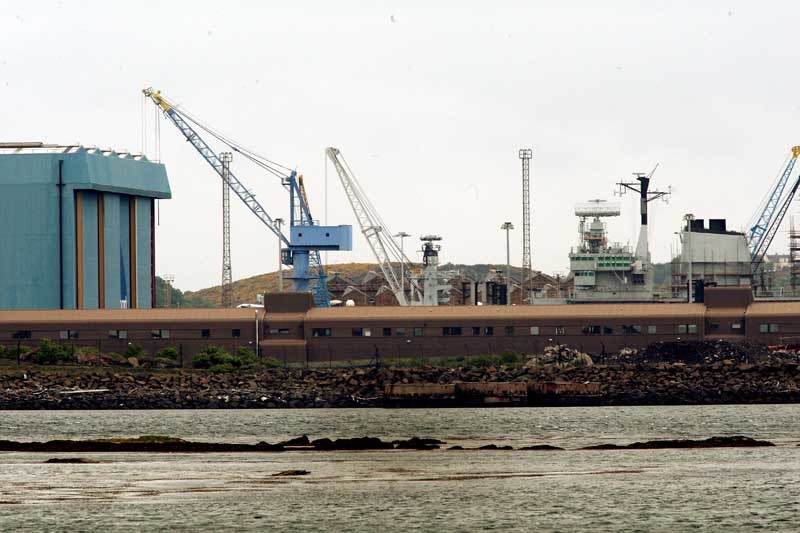A former submariner has criticised “misinformed” comments from local councillors who are against “dumping” nuclear submarines at Rosyth.
Kirkcaldy man Sandy Stuart said, “I think it’s important that the public get an overall view of the problem, not two councillors gum beating about something even with so-called information they obviously know very little about and (who) are, in my estimation, trying to score political points.”
Mr Stuart was responding to points made by councillor Douglas Chapman, who feared the yard could be lumbered with radioactive waste for years to come.
MoD chiefs are looking at how to dispose of the Royal Navy’s decommissioned subs, seven of which are already stored on the Forth.
They are considering either cutting out the reactor compartments and storing them or chopping up the subs altogether and it is believed the Fife yard will be in the running for the contract to carry out the dismantling work.
The dockyard could even be used to house low and intermediate-level radioactive waste, as it has a licensed store on site.But Mr Chapman has insisted that if there is to be any dismantling and storage, it should be done at Devonport as the English yard won the contract to refit the Trident fleet in the 90s, and so should deal with the decommissioned subs.
His views were backed by SNP councillor Bill Walker, who said he was worried the site is just being used as a “dumping ground” by the MoD and feared the submarines stored there could hamper future development.
But Mr Stuart said, “It is a problem that is being looked at and to say ‘give them to Devonport’ is childish and contemptible it’s passing the buck not addressing the problem, which both should be doing.”
Mr Stuart said that as an “old sailor” he simply wanted a balanced view to be presented of a problem that will not be solved “by saying give it to Devonport.”
Mr Stuart, a crewman on the Polaris submarine HMS Resolution, said he and fellow members of the submarine’s association were allowed by yard owner Babcock and the MoD to visit Rosyth and lay a wreath at its side.
“She was in excellent condition you would have thought she was ready for sea. Around 80 members in two parties of 40 were allowed down our old boat for the visit. Does the councillor think that if there was any radiation problems, the MoD and Babcock would have allowed us down the boat? I think not,” he said.
Mr Stuart, who served on board Resolution from 1968-72 as petty officer radio electrician in the navigation centre, said he thought it would be well-nigh impossible to tow the subs to Devonport for disposal.
He said, “The hulls are not trimmed for sea; a submarine has ballast tanks to do this and you need systems operational to do this, which have long been unused. You would need to have a lighter either side of each hull to keep them upright and at least four tugs each hull in attendance just to tow them in a calm sea.
“I doubt very much if Lloyds would insure such a venture and getting them into Plymouth is a lot more difficult navigation-wise than a straight run up the Forth.”
He added there were also issues with cutting the submarines up and with corrosion on board, but these were not localised issues.
“In the USA there are whole rows of boats tied up in sea lochs waiting for the same problem to be resolved. It is a world-wide problem of many navies that operate nuclear plants on their vessels.
“I do hope the government comes up with a solution as it is certainly a big problem that needs addressing, but, I’m sorry to say, not the councillors’ way.”
